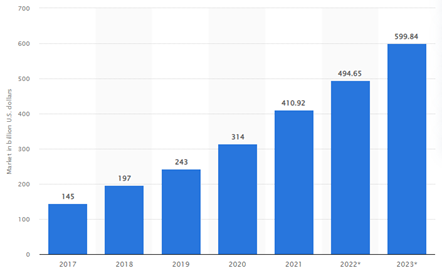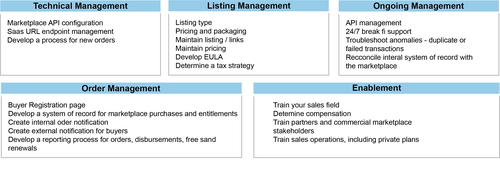What are Cloud Marketplaces?
Thousands of software offerings from various categories such as data & analytics, business applications or security. Any industry, regardless of whether it's financial services, healthcare, retail or other public sector companies - any company would find it easier to search for software solutions with the help of a Marketplace. Serious advantages here are choice, speed and agility. For example, AWS Marketplace advertises the phrase: "Find, test, buy, and implement ..." (Source)
But what exactly are cloud marketplaces anyway? This blog post includes a precise definition and shows you the benefits by evolving the ancient marketplace through the ravages of time.
Cloud Marketplace Definition
A cloud marketplace is an online marketplace, operated by a cloud service provider (CSP), where customers can browse through and subscribe to software applications and developer services that are built on, integrated with, or supplement the CSP’s main offering. (Source)
A Cloud marketplace is a type of application marketplace. It is synonymous with SaaS (Software as a Service) marketplace. At a global cloud marketplace, customers can go to an online storefront to find, purchase, and manage cloud-based applications. Cloud marketplaces can offer various degrees of functionality, from simple listings where customers can compare SaaS products and be referred to a vendor to complete their purchases, to a full digital commerce experience that allows customers to buy and immediately provision software. (Source)
The worldwide public cloud computing market continues to grow and is expected to reach an estimated 495 billion U.S. dollars within 2022. This encompasses business processes, platform, infrastructure, software, management, security, and advertising services delivered by public cloud services. (Source)

What Cloud Computing used for?
Most of the highest cloud providers have same services available: virtual machines, containers, databases, serverless functions, isolated cloud network etc. Those are just small example of cloud solutions available publicly on different cloud providers, of course with different naming convention. Those services could be related in groups defined by public cloud provider for different occasions, usage, industry, and organization type. Any cloud-based solution refers to applications, storage, on-demand services, computer networks, or other resources that are accessed with an internet connection through another provider’s shared cloud computing framework.
The simplest way to thinking of cloud computing is by comparing it to electricity. Your home and business have it, but you don’t need a power plant on your property in order to use it. You just connect to the one supplier that provides electricity to your area. (Source)
Listings on Cloud Marketplaces
Cloud Marketplaces delivers different options for publishers depending on their needs and needs of their customers. To start using cloud solutions there are many parameters which should be defined. The best description would give this chart for any public cloud provider: (Source)

Example to all public cloud providers, they can create listings on: SaaS, application, virtual machines, containers, IoT modules, managed services etc. Smaller steps at creating a listing such as licensing, marketing, support handling and other are involved in listings and offer a possibility of default option by public cloud provider’s side.
Moving into the cloud
Would you like to learn more about the cloud? Then feel free to visit our corresponding blog category.
At Libelle IT Group, we also rely on the advantages of the cloud and provide you with various solutions. Use the cloud editions of Libelle DataMasking (AWS / Microsoft Azure), Libelle SystemCopy (AWS / Microsoft Azure) or Libelle CloudShadow (IBM Cloud) now.
Recommended articles
All blog articles